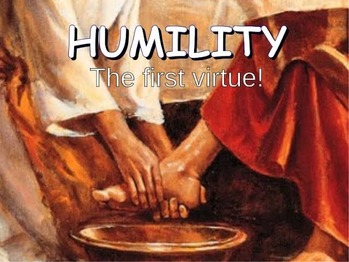Search
-
 October 26, 2025In a nutshell, the Catholic meaning of “humility” is a virtue that acknowledges God as the author of all good, emphasizing Hs greatness over our own. St. Augustine states that the most important virtue is “humility, humility, humility.” (Eph 118.22)
October 26, 2025In a nutshell, the Catholic meaning of “humility” is a virtue that acknowledges God as the author of all good, emphasizing Hs greatness over our own. St. Augustine states that the most important virtue is “humility, humility, humility.” (Eph 118.22)
Our gospel this weekend, Luke 18:8-14), calls us to reflect deeply on humility and the disposition of our hearts before God. We hear a parable by Jesus that tells of two men who go to temple to pray, one a Pharisee, the other a tax collector. The Pharisee stands up proudly and thanks God aloud—making His praise of God a public testimony—and telling God he is thankful that he is not like the others, thus listing all of his virtues and good deeds. The tax collector, on the other hand, stands off to the side at a distance unable to even lift his head and says simply, “God, be merciful to me, a sinner.”
Jesus tells us that it is the tax collector who leaves the temple justified, not the Pharisee. You see, God values a humble and contrite heart over pride and self-righteousness. After all, this parable is to remind us that no one is perfect, save for God; we all need His Mercy. It is true holiness that begins with our recognizing our own need for grace and favor, and for opening our hearts to God’s loving forgiveness. It is all about the willingness to open up to His power to be conformed and transformed by Christ.
In a practical way, how do we grow in our own humility, what are the things we can do to illustrate our belief that ALL our gifts come from God? Prayer that calls us to recognize God as the Creator God is a good place to begin. My “brains,” my “gifts and talents,” my abilities to “do my job well and earn a good living,” all stem from Him. He created me and gave me my gifts. If we adopt the attitude of the tax collector in today’s gospel and acknowledge our own sinfulness, if we come before God honestly and humbly, aware of our weaknesses but also trusting in His infinite mercy, then that’s the beginning of our holy journey in faith. Avoid the temptation to compare ourselves to others, e.g., the Pharisee, not judge them and rank ourselves “a better sinner.” But instead grow in love and compassion and humility. Then we shall be on the “path to Christ, complete with humility.”
Five Ways to Grow in Humility:- Recognize your dependency on God; Prayer and thankfulness of-and-for our gifts reminds us that we are not self-sufficient;
- Practice honest, self-examination; Reconciliation helps defeat pride and opens the way to grow in holiness;
- Serve others with love and without seeking recognition; humility is shown in acts of charity;
- Accept correction and be open to learning from others; humility breaks down pride and build-up community, and,
- Avoid judging others. Pride leads us to judge others.